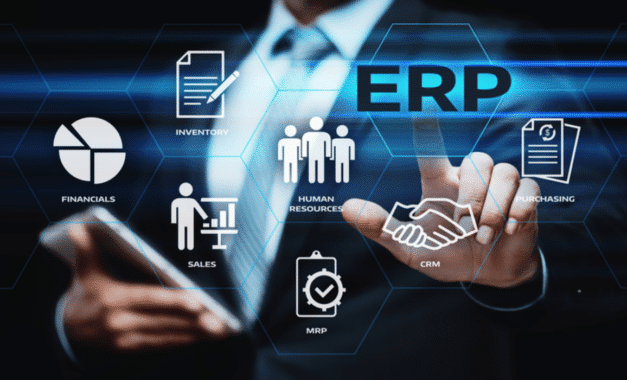Healthcare ERP System: Streamlining Operations for Improved Patient Care – The healthcare industry is complex, with multiple interconnected departments and functions that require seamless coordination for optimal patient outcomes. Managing these different aspects efficiently is crucial to delivering high-quality healthcare services. One solution that has become increasingly popular for enhancing operational efficiency is the Healthcare ERP system (Enterprise Resource Planning). By integrating various processes into a single platform, a Healthcare ERP system helps hospitals, clinics, and other medical institutions improve resource management, reduce costs, and ultimately provide better patient care.

What is a Healthcare ERP System?
A Healthcare ERP system is a comprehensive software platform designed to integrate and manage various functions within a healthcare organization. It encompasses a wide range of activities, such as financial management, human resources, inventory control, patient records, and supply chain management. By bringing these processes together in a single system, a Healthcare ERP helps streamline operations, ensuring that data flows seamlessly across departments and enabling healthcare providers to make data-driven decisions.
The primary goal of a Healthcare ERP system is to centralize data and automate routine tasks, which helps in minimizing human errors, reducing administrative burdens, and improving the quality of care provided to patients. Unlike traditional standalone systems that serve only one department, a Healthcare ERP offers a unified approach, allowing different departments to work in coordination with one another.
Key Features of Healthcare ERP Systems
Healthcare ERP systems come with a variety of features tailored specifically for the healthcare industry. These features include:
- Patient Management
The system helps in managing patient records, including medical history, treatment plans, and billing information. By centralizing patient data, healthcare providers can access accurate and up-to-date information, leading to better clinical decision-making. Additionally, patient scheduling and appointment management are streamlined, reducing wait times and improving patient satisfaction. - Financial Management
Healthcare institutions face unique financial challenges, including managing billing, claims, payroll, and budgets. A Healthcare ERP system integrates financial processes, ensuring accurate billing and timely reimbursements from insurance companies. It also helps monitor cash flow and manage the financial health of the organization. - Human Resources Management
Managing the workforce in healthcare is a complex task, as it involves handling shift rotations, leave management, payroll, and training. The ERP system helps automate HR processes, making it easier to track employee performance, schedule staff, and comply with regulatory requirements. - Supply Chain and Inventory Management
Medical supplies, pharmaceuticals, and equipment are critical resources in healthcare. A Healthcare ERP system tracks inventory levels in real time, manages procurement processes, and ensures that supplies are available when needed. This helps in minimizing wastage and avoiding stockouts, which can disrupt patient care. - Compliance and Regulatory Reporting
The healthcare industry is highly regulated, with strict requirements for data security, patient privacy, and reporting. Healthcare ERP systems facilitate compliance by automating regulatory reporting, maintaining audit trails, and ensuring that data management practices align with industry standards. - Electronic Health Records (EHR) Integration
A significant advantage of Healthcare ERP is its ability to integrate with EHR systems, allowing for a seamless exchange of patient information between clinical and administrative departments. This integration helps in providing a comprehensive view of patient data, which is essential for diagnosis, treatment, and ongoing care management. - Analytics and Reporting
The ability to generate detailed reports and analytics is a crucial feature of a Healthcare ERP system. By leveraging data analytics, healthcare organizations can gain insights into patient trends, operational performance, and financial metrics. This information supports strategic planning and helps identify areas for improvement.
Benefits of Implementing a Healthcare ERP System
The implementation of a Healthcare ERP system offers several advantages that help healthcare organizations optimize operations and enhance patient outcomes:
- Improved Efficiency and Workflow Automation
Healthcare ERP systems automate repetitive administrative tasks, such as billing, inventory management, and payroll processing. This automation reduces the time staff spend on manual tasks, allowing them to focus on patient care. Workflow automation also helps eliminate bottlenecks in processes, ensuring that tasks are completed more quickly and accurately. - Enhanced Patient Care and Safety
With centralized patient data and real-time access to medical records, healthcare providers can make better-informed clinical decisions. This reduces the likelihood of errors, such as prescribing incorrect medication or missing important details in a patient’s medical history. Furthermore, efficient scheduling and resource management ensure that patients receive timely care, enhancing their overall experience. - Cost Reduction
By streamlining processes and optimizing resource utilization, Healthcare ERP systems help reduce operational costs. For instance, inventory management features minimize waste by preventing overstocking or understocking of medical supplies. Automation of billing and claims processing also reduces administrative costs associated with manual data entry and reduces delays in reimbursements. - Data-Driven Decision Making
Healthcare ERP systems provide access to a wealth of data that can be used for strategic planning and operational improvements. Advanced analytics tools within the ERP allow organizations to identify trends in patient care, monitor financial performance, and forecast future resource needs. Data-driven decision-making enables healthcare providers to allocate resources more effectively and improve service delivery. - Compliance and Risk Management
The healthcare industry is subject to numerous regulations and standards, such as the Health Insurance Portability and Accountability Act (HIPAA) in the United States. Healthcare ERP systems facilitate compliance by ensuring that data handling and storage practices meet regulatory requirements. Automated reporting features also reduce the risk of non-compliance, which can result in significant penalties. - Scalability
Healthcare organizations can grow and expand their services over time. A Healthcare ERP system is designed to be scalable, allowing new modules and features to be added as needed. This ensures that the ERP system can continue to support the organization’s evolving needs without requiring a complete overhaul.
Challenges in Implementing a Healthcare ERP System
While the benefits of Healthcare ERP systems are substantial, the implementation process can be challenging. Some of the common challenges include:
- High Initial Costs
The upfront investment for a Healthcare ERP system can be significant, especially for smaller healthcare organizations. Costs may include software licensing, hardware upgrades, data migration, and training. While the long-term savings from improved efficiency often outweigh the initial costs, securing the necessary budget can be a barrier for some institutions. - Complexity in Customization and Integration
Healthcare organizations have unique processes and requirements, which may necessitate customization of the ERP system. Additionally, integrating the ERP with existing systems, such as EHRs or laboratory information management systems, can be complex. Customization and integration efforts may extend the implementation timeline and increase costs. - Data Migration and System Transition
Migrating data from legacy systems to a new ERP platform is a critical step that requires careful planning. Incomplete or inaccurate data migration can lead to disruptions in operations and data inconsistencies. It is essential to validate data accuracy during the migration process to ensure a smooth transition. - Employee Training and Change Management
Adopting a new Healthcare ERP system requires staff to learn how to use the new platform effectively. Inadequate training can result in poor system utilization and resistance to change. Therefore, organizations should invest in comprehensive training programs and employ change management strategies to facilitate the adoption of the new system.
The Future of Healthcare ERP Systems
As technology continues to advance, Healthcare ERP systems are evolving to meet the changing needs of the healthcare industry. Some of the key future trends include:
- Artificial Intelligence (AI) and Machine Learning (ML)
AI and ML are being integrated into Healthcare ERP systems to enhance functionalities, such as predictive analytics, personalized medicine, and automated administrative tasks. These technologies can help in predicting patient outcomes, optimizing scheduling, and even automating complex processes, such as claims adjudication. - Cloud-Based ERP Solutions
The shift towards cloud-based ERP systems is gaining momentum due to the flexibility and scalability they offer. Cloud-based solutions allow healthcare providers to access the ERP system from anywhere, facilitating remote work and enabling easier system updates. Additionally, cloud deployment reduces the need for costly on-premise infrastructure. - Internet of Medical Things (IoMT) Integration
IoMT devices, such as wearable health monitors, can be integrated with Healthcare ERP systems to provide real-time patient data. This integration can improve remote patient monitoring, chronic disease management, and proactive healthcare interventions. IoMT data also enhances the accuracy of patient records within the ERP system. - Focus on Patient-Centric Care
As patient expectations evolve, Healthcare ERP systems are being designed to support patient-centric care models. This includes features such as telemedicine integration, patient portals for self-service, and personalized treatment plans. Enhancing patient engagement through ERP systems can lead to better health outcomes and higher patient satisfaction.
Conclusion
Healthcare ERP systems are transforming the way healthcare organizations operate by streamlining processes, improving patient care, and enabling data-driven decision-making. While challenges exist in implementing these systems, the long-term benefits of improved efficiency, cost reduction, and better compliance make them a valuable investment for healthcare institutions. As the industry continues to evolve, Healthcare ERP systems will play a pivotal role in shaping the future of healthcare, ensuring that providers can meet the growing demands for quality and accessible care.

